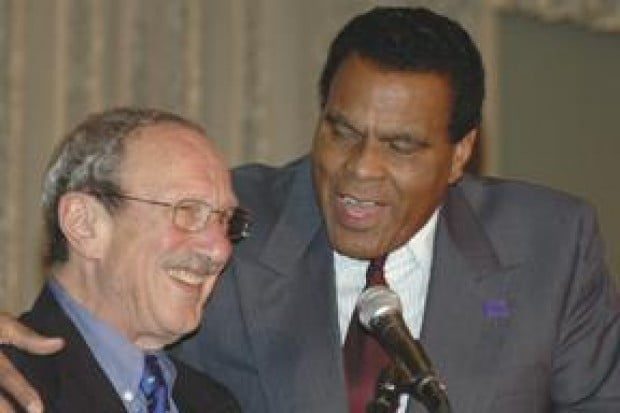
You could say a great deal about Malibu resident Tommy Hawkins, but never that he’s boring. Two-time All American basketball star, leading draft pick for the Lakers before they were even in Los Angeles, on-air sports analyst, talk show host, director of communications for one of the nation’s most powerful sports franchises, popular public speaker and, to top it off, host of an eclectic jazz program for a public radio broadcast whose tone is so intimate, he plays selections from his own private library that aren’t even available commercially anymore.
“I guess I’ve led an eclectic life,” Hawkins said.
Growing up in Chicago, Hawkins quickly earned street credibility with outstanding basketball skills and friendships with local jazz musicians. “I grew up hanging with guys like Herbie Hancock, Ramsey Lewis and Eddie Harris,” he said. “Jazz is America’s true, original art form.”
But it was Hawkins’ skill on the court that launched his first career. Landing a four-year scholarship at the University of Notre Dame, where he studied sociology and psychology, he captained the team at a time when there were only 10 black students at Notre Dame and he was the only African American who played basketball.
“My coach, Donnie Jordan, was behind me all the way,” Hawkins said. “Major schools were only starting to recruit black athletes, but I found no discrimination there at all.”
However, segregation rules were still in place in the South. “This was 1955, three years before Martin Luther King or Rosa Parks,” Hawkins said. “But our university president, Father Theodore Hesberg said, ‘Any place Tommy Hawkins isn’t welcome, Notre Dame isn’t welcome.’ This was integration in the raw.”
Upon graduation, Hawkins was promptly drafted by the Minneapolis Lakers, the first NBA dynasty, having won four championships during the ’40s. His starting salary was $20,000. “And that was high for a rookie,” he said. The next year, the team moved to Los Angeles.
“Back then, basketball wasn’t a big thing in California,” Hawkins mused. “We weren’t baseball darlings, like Jackie Robinson and the Dodgers.”
Far from being greeted with open arms, the team “sort of slunk in, driving through San Bernardino at midnight,” Hawkins said, laughing. “No one knew us and no one cared. That first year, we had no broadcast sponsors and maybe 3,000 people came to a game. We used to drive through neighborhoods in vans with those loudspeakers on the top, begging people to come see us play.”
Their gamesmanship quickly turned that around. By the end of the first season, they had sell-out crowds. Hawkins played in L.A. three years before he was traded to the Cincinnati Royals. Four years later, his team was playing the Lakers when his old general manager invited him to an after-game party.
“An old guy came up to me there and told me that he was going to purchase the Lakers, bring in a hockey team and buy my contract,” Hawkins said. “I just laughed. A few weeks later, a guy calls me and says, ‘My name is Jack Kent Cooke and I just bought your contract. Next time, have a little confidence in me.'”
Hawkins played three more years before retiring and moved directly into TV and radio broadcasting. “I spent several years co-hosting local morning talk shows. I was the first black man to host a nonsports talk show and I was doing two hours live,” Hawkins said. “I interviewed everyone from the foreign minister of Taiwan to Jimmy Carter when he was struggling to be recognized as presidential material.”
But basketball being his mojo, he shifted to sports, anchoring with KNBC. “Then I worked as network basketball analyst with Curt Gowdy and Jim Simpson covering NCAA games,” Hawkins said. “College basketball became huge.”
In 1987, he got an offer from Peter O’Malley, owner of the Dodgers behemoth, to act as director of communications for the entire organization, the first time a black man would hold an executive position in a sports franchise.
This was at a time when veteran Dodger general manager Al Campanis had ignited a firestorm for saying blacks were unsuited for management positions in Major League Baseball. “Poor Al,” Hawkins said. “He was the sweetest guy in the world and got caught up saying something that didn’t come out right.”
Hawkins asserts that Campanis was simply the sacrificial lamb for existing racial discrimination in sports.
Hawkins left the Dodgers in 2004. His “semi-retirement” sees him running a speakers’ bureau, sitting on a multitude of charitable boards and hosting a five-hour live radio program for K-JAZZ, the local publicly supported jazz station out of Cal State Long Beach.
Managing director Saul Levine is thrilled to bring Hawkins aboard. “Tommy is so articulate and has such class,” Levine said. “He’s a great spokesman and brings extensive knowledge of jazz to the show. We can’t wait to see where he’ll go with it.”
Hawkins does all his own programming. “From John Coltrane to the latest Latin-funk sound, I’ll play ’em if they’re good,” Hawkins said. “Jazz is making a resurgence and I’m featuring some home-grown jazz groups. I select my program eclectically, the way I’ve lived.”
Tommy Hawkins’ show can be heard on KJAZZ, 88.1 FM, on Saturdays from 9 a.m.-2 p.m.
